- Home
- Robin McKinley
A Knot in the Grain
A Knot in the Grain Read online
PRAISE FOR THE WRITING OF ROBIN McKINLEY
The Hero and the Crown
A Newbery Medal winner, an ALA Notable Book, and an ALA Best Book for Young Adults
“Robin McKinley’s Damar books are among the finest sword and sorcery being written today.” —Locus
“Beautifully rendered … McKinley’s battle scenes are galvanizing and her romantic ones stirring, her characterizations have vitality, and her way with animal characters makes them distinct individuals without losing their animality.” —Booklist, starred review
“As richly detailed and elegant as a medieval tapestry … Vibrant, witty, compelling, the story is the stuff of which true dreams are made.” —The Horn Book
“Splendid high fantasy … Filled with tender moments, good characters, satisfying action and sparkling dialogue … Superb!” —School Library Journal, starred review
“Refreshing … Haunting … An utterly engrossing fantasy!” —The New York Times
The Outlaws of Sherwood
“McKinley brings to the Robin Hood legend a robustly romantic view. She renders it anew by fully developing the background and motive of each member of the merry band.… She presents a solid piece of tale-weaving, ingenious and ingenuous, causing readers to suspend belief willingly for a rousing good time.” —Publishers Weekly
“Readers ready to think beyond stereotypes of glorious violence will find [this] Robin a hero for our times.” —Booklist
Beauty
An ALA Notable Children’s Book
“A splendid story.” —Publishers Weekly
“A captivating novel.” —Booklist
The Door in the Hedge
“She knows her geography of fantasy, the nuances of the language, the atmosphere of magic where running deer become beautiful maidens and frogs handsome princes.” —The Washington Post
A Knot in the Grain
“The strange, rich magic of fairy tales is amplified and made highly personal in five stories by Newbery Medalist McKinley. A pragmatic, unapologetic feminism infuses each tale: while McKinley’s adventurous heroines certainly do not eschew love, neither do they pine after princes and castles. Instead, each of these down-to-earth young women actively seeks a partner—however unusual—who suits her. A thrilling, satisfying and thought-provoking collection.” —Publishers Weekly
A Knot in the Grain
and Other Stories
Robin McKinley
TO
Mary Lou,
who brought me to
Cumberland Lodge
Contents
The Healer
The Stagman
Touk’s House
Buttercups
A Knot in the Grain
About the Author
The Healer
The child was born just as the first faint rays of dawn made their way through the cracks between the shutters. The lantern-wick burned low. The new father bowed his head over his wife’s hand as the midwife smiled at the mite of humanity in her arms. Black curls framed the tiny face; the child gave a gasp of shock, then filled its lungs for its first cry in this world; but when the little mouth opened, no sound came out. The midwife tightened her hands on the warm wet skin as the baby gave a sudden writhe, and closed its mouth as if it knew that it had failed at something expected of it. Then the eyes stared up into the midwife’s own, black, and clearer than a newborn’s should be, and deep in them such a look of sorrow that tears rose in the midwife’s own eyes.
“The child does not cry,” the mother whispered in terror, and the father’s head snapped up to look at the midwife and the baby cradled in her arms.
The midwife could not fear the sadness in this baby’s eyes; and she said shakily, “No, the baby does not cry, but she is a fine girl nonetheless”; and the baby blinked, and the look was gone. The midwife washed her quickly, and gave her into her mother’s eager, anxious arms, and saw the damp-curled, black-haired head of the young wife bend over the tiny curly head of the daughter. Her smile reminded the midwife of the smiles of many other new mothers, and the midwife smiled herself, and opened a shutter long enough to take a few deep breaths of the new morning air. She closed it again firmly, and chased the father out of the room so that mother and child might be bathed properly, and the bedclothes changed.
They named her Lily. She almost never cried; it was as though she did not want to call attention to what she lacked, and so at most her little face would screw itself into a tiny red knot, and a few tears would creep down her cheeks; but she did not open her mouth. She was her parents’ first child, and her mother hovered over her, and she suffered no neglect for her inability to draw attention to herself.
When Lily was three years old, her mother bore a second child, another daughter; when she was six and a half, a son was born. Both these children came into the world howling mightily. Lily seemed to find their wordless crying more fascinating than the grown-ups’ speech, and when she could she loved to sit beside the new baby and play with it gently, and make it chuckle at her.
By the time her little brother was taking his first wobbly steps it had become apparent that Lily had been granted the healer’s gift. A young cow or skittish mare would foal more quietly with her head in Lily’s lap; children with fever did not toss and turn in their beds if Lily sat beside them; and it was usually in Lily’s presence that the fevers broke, and the way back to health began.
When she was twelve, she was apprenticed to the midwife who had birthed her.
Jolin by then was a strong handsome woman of forty-five or so. Her husband had died when they had had only two years together, and no children; and she had decided that she preferred to live alone as a healer after that. But it was as the midwife she was best known, for her village was a healthy one; hardly anyone ever fell from a horse and broke a leg or caught a fever that her odd-smelling draughts could not bring down.
“I’ll tell you, young one,” she said to Lily, “I’ll teach you everything I know, but if you stay here you won’t be needing it; you’ll spend the time you’re not birthing babies sewing little sacks of herbs for the women to hang in the wardrobes and tuck among the linens. Can you sew properly?” Lily nodded, smiling; but Jolin looked into her black eyes and saw the same sorrow there that she had first seen twelve years ago. She said abruptly, “I’ve heard you whistling. You can whistle more like the birds than the birds do. There’s no reason you can’t talk with those calls; we’ll put meanings to the different ones, and we’ll both learn ’em. Will you do that with me?”
Lily nodded eagerly, but her smile broke, and Jolin looked away.
Five years passed; Jolin had bought her apprentice a horse the year before, because Lily’s fame had begun to spread to neighboring towns, and she often rode a long way to tend the sick. Jolin still birthed babies, but she was happy not to have to tend stomachaches at midnight anymore, and Lily was nearly a woman grown, and had surpassed her old teacher in almost all Jolin had to offer her. Jolin was glad of it, for it still worried her that the sadness stayed deep in Lily’s eyes and would not be lost or buried. The work meant much to each of them; for Jolin it had eased the loss of a husband she loved, and had had for so little time she could not quite let go of his memory; and for Lily, now, she thought it meant that which she had never had.
Of the two of them, Jolin thought, Lily was the more to be pitied. Their village was one of a number of small villages, going about their small concerns, uninterested in anything but the weather and the crops, marriages, births, and deaths. There was no one within three days’ ride who could read or write, for Jolin knew everyone; and the birdcall-speech that she and her apprentice had made was enough for crops and weather, births and deaths, but Jolin saw other things passi
ng swiftly over Lily’s clear face, and wished there were a way to let them free.
At first Jolin had always accompanied Lily on her rounds, but as Lily grew surer of her craft, somehow she also grew able to draw what she needed to know or to borrow from whomever she tended; and Jolin could sit at home and sew her little sacks of herbs and prepare the infusions Lily would need, and tend the several cats that always lived with them, and the goats in the shed and the few chickens in the coop that survived the local foxes.
When Lily was seventeen, Jolin said, “You should be thinking of marrying.” She knew at least two lads who followed Lily with their eyes and were clumsy at their work when she was near, though Lily seemed unaware of them.
Lily frowned and shook her head.
“Why not?” Jolin said. “You can be a healer as well. I was. It takes a certain kind of man”—she sighed—“but there are a few. What about young Armar? He’s a quiet, even-handed sort, who’d be proud to have a wife that was needed by half the countryside. I’ve seen him watching you.” She chuckled. “And I have my heart set on birthing your first baby.”
Lily shook her head more violently, and raised her hands to her throat.
“You can learn to whistle at him as you have me,” Jolin said gently, for she saw how the girl’s hands shook. “Truly, child, it’s not that great a matter; five villages love you and not a person in ’em cares you can’t talk.”
Lily stood up, her eyes full of the bitter fire in her heart, and struck herself on the breast with her fist, and Jolin winced at the weight of the blow; she did not need to hear the words to know that Lily was shouting at her: I do!
Lily reached her twentieth year unmarried, although she had had three offers, Armar among them. The crop of children in her parents’ home had reached seven since she had left them eight years ago; and all her little brothers and sisters whistled birdcalls at her when she whistled to them. Her mother called her children her flock of starlings; but the birds themselves would come and perch on Lily’s outstretched fingers, and on no one else’s.
Lily was riding home from a sprained ankle in a neighboring village, thinking about supper, and wondering if Karla had had her kittens yet when she realized she was overtaking another traveller on the road. She did not recognize the horse, and reined back her own, for she dreaded any contact with strangers; but the rider had already heard her approach and was waiting for her. Reluctantly she rode forward. The rider threw back the hood of his cloak as she approached and smiled at her. She had never seen him before; he had a long narrow face, made longer by lines of sorrow around his mouth. His long hair was blond and grey mixed, and he sat his horse as if he had been sitting on horseback for more years past than he would wish to remember. His eyes were pale, but in the fading twilight she could not see if they were blue or grey.
“Pardon me, lady,” he greeted her, “but I fear I have come wrong somewhere. Would you have the goodness to tell me where I am?”
She shook her head, looking down at the long quiet hands holding his horse’s reins, then forced herself to look up, meeting his eyes. She watched his face for comprehension as she shook her head again, and touched two fingers to her mouth and her throat; and said sadly to herself, I cannot tell you anything, stranger. I cannot talk.
The stranger’s expression changed indeed, but the comprehension she expected was mixed with something else she could not name. Then she heard his words clearly in her mind, although he did not move his lips. Indeed, but I can hear you, lady.
Lily reached out, not knowing that she did so, and her fingers closed on a fold of the man’s cloak. He did not flinch from her touch, and her horse stood patiently still, wanting its warm stall and its oats, but too polite to protest. Who—who are you? she thought frantically. What are you doing to me?
Be easy, lady. I am—here there was an odd flicker—a mage, of sorts; or once I was one. I retain a few powers. I—and his thought went suddenly blank with an emptiness that was much more awful than that of a voice fallen silent—I can mindspeak. You have not met any of … us … before?
She shook her head.
There are not many. He looked down into the white face that looked up at him and felt an odd creaky sensation where once he might have had a heart.
Where are you going? she said at last.
He looked away; she thought he stared at the horizon as if he expected to see something he could hastily describe as his goal.
I do not mean to question you, she said; forgive me, I am not accustomed to … speech … and I forget my manners.
He smiled at her, but the sad lines around his mouth did not change. There is no lack of courtesy, he replied; only that I am a wanderer, and I cannot tell you where I am going. He looked up again, but there was no urgency in his gaze this time. I have not travelled here before, however, and even a … wanderer … has his pride; and so I asked you the name of this place.
She blushed that she had forgotten his question, and replied quickly, the words leaping into her mind. The village where I live lies just there, over the little hill. Its name is Rhungill. That way—she turned in her saddle—is Teskip, where I am returning from; this highway misses it, it lay to your right, beyond the little forest as you rode this way.
He nodded gravely. You have always lived in Rhungill?
She nodded; the gesture felt familiar, but a bubble of joy beat in her throat that she need not halt with the nod. I am the apprentice of our healer.
He was not expecting to hear himself say: Is there an inn in your village, where a wanderer might rest for the night? In the private part of his mind he said to himself: There are three hours till sunset; there is no reason to stop here now. If there are no more villages, I have lain by a fire under a tree more often than I have lain in a bed under a roof for many years past.
Lily frowned a moment and said, No-o, we have no inn; Rhungill is very small. But there is a spare room—it is Jolin’s house, but I live there too—we often put people up, who are passing through and need a place to stay. The villagers often send us folk. And because she was not accustomed to mindspeech, he heard her say to herself what she did not mean for him to hear: Let him stay a little longer.
And so he was less surprised when he heard himself answer: I would be pleased to spend the night at your healer’s house.
A smile, such as had never before been there, bloomed on Lily’s face; her thoughts tumbled over one another and politely he did not listen, or let her know that he might have. She let her patient horse go on again, and the stranger’s horse walked beside.
They did not speak. Lily found that there were so many things she would like to say, to ask, that they overwhelmed her; and then a terrible shyness closed over her, for fear that she would offend the stranger with her eagerness, with the rush of pent-up longing for the particulars of conversation. He held his silence as well, but his reasons stretched back over many wandering years, although once or twice he did look in secret at the bright young face beside him, and again there was the odd, uncomfortable spasm beneath his breastbone.
They rode over the hill and took a narrow, well-worn way off the highway. It wound into a deep cutting, and golden grasses waved above their heads at either side. Then the way rose, or the sides fell away, and the stranger looked around him at pastureland with sheep and cows grazing earnestly and solemnly across it, and then at empty meadows; and then there was a small stand of birch and ash and willow, and a small thatched house with a strictly tended herb garden around it, laid out in a maze of squares and circles and borders and low hedges. Lily swung off her small gelding at the edge of the garden and whistled: a high thin cry that told Jolin she had brought a visitor.
Jolin emerged from the house smiling. Her hair, mostly grey now, with lights of chestnut brown, was in a braid; and tucked into the first twist of the hair at the nape of her neck was a spray of yellow and white flowers. They were almost a halo, nearly a collar.
“Lady,” said the stranger, and dismounted.
“Jolin,” said the stranger, but Jolin did not think it odd that he knew her name, for often the villagers sent visitors on with Lily when they saw her riding by, having supplied both their names first. “I am called Sahath.”
Lily moved restlessly; there was no birdcall available to her for this eventuality. She began the one for talk, and broke off. Jolin glanced at her, aware that something was troubling her.
Sahath, said Lily, tell Jolin—and her thought paused, because she could not decide, even to herself, what the proper words for it were.
But Jolin was looking at their guest more closely, and a tiny frown appeared between her eyes.
Sahath said silently to Lily, She guesses.
Lily looked up at him; standing side by side, he was nearly a head taller than she. She—?
Jolin had spent several years traveling in her youth, travelling far from her native village and even far from her own country; and on her travels she had learned more of the world than most of the other inhabitants of Rhungill, for they were born and bred to live their lives on their small landplots, and any sign of wanderlust was firmly suppressed. Jolin, as a healer and so a little unusual, was permitted wider leeway than any of the rest of Rhungill’s daughters; but her worldly knowledge was something she rarely admitted and still more rarely demonstrated. But one of the things she had learned as she and her mother drifted from town to town, dosing children and heifers, binding the broken limbs of men and pet cats, was to read the mage-mark.
“Sir,” she said now, “what is one such as you doing in our quiet and insignificant part of the world?” Her voice was polite but not cordial, for mages, while necessary for some work beyond the reach of ordinary mortals, often brought with them trouble as well; and an unbidden mage was almost certainly trouble. This too she had learned when she was young.

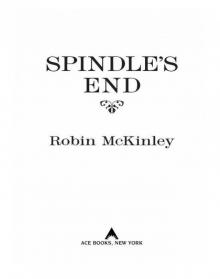 Spindle's End
Spindle's End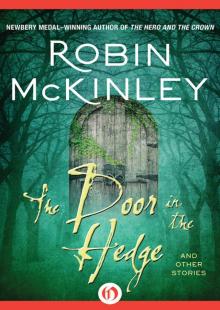 The Door in the Hedge: And Other Stories
The Door in the Hedge: And Other Stories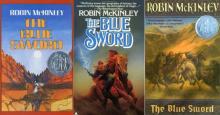 The Blue Sword
The Blue Sword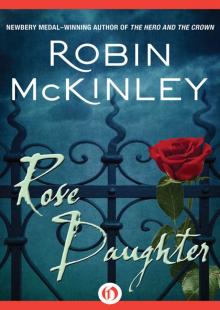 Rose Daughter
Rose Daughter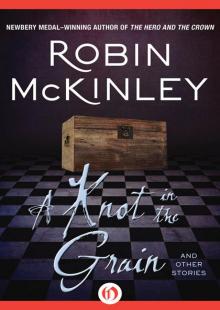 A Knot in the Grain and Other Stories
A Knot in the Grain and Other Stories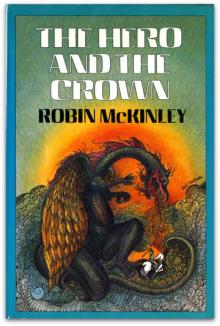 The Hero And The Crown
The Hero And The Crown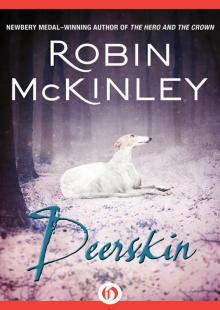 Deerskin
Deerskin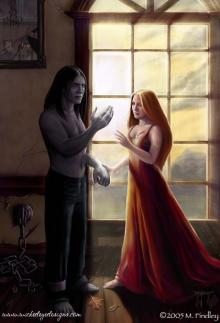 Sunshine
Sunshine Beauty: A Retelling of the Story of Beauty and the Beast
Beauty: A Retelling of the Story of Beauty and the Beast Shadows
Shadows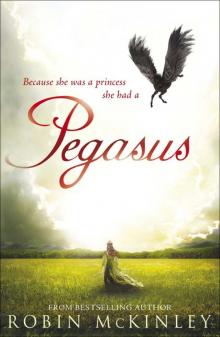 Pegasus
Pegasus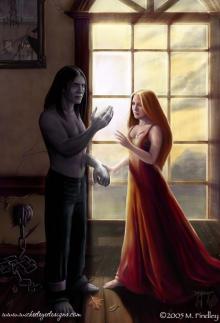 Chalice
Chalice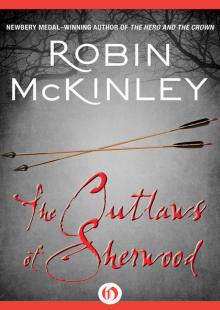 The Outlaws of Sherwood
The Outlaws of Sherwood Fire: Tales of Elemental Spirits
Fire: Tales of Elemental Spirits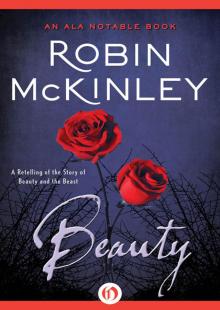 Beauty
Beauty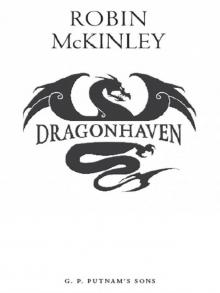 Dragon Haven
Dragon Haven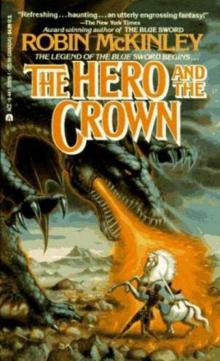 The Hero And The Crown d-2
The Hero And The Crown d-2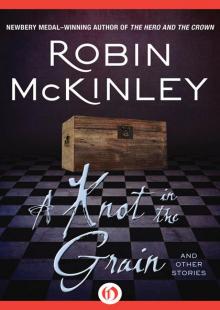 A Knot in the Grain
A Knot in the Grain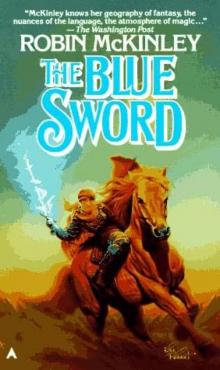 The Blue Sword d-1
The Blue Sword d-1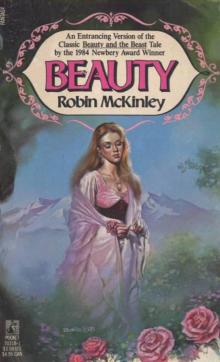 Beauty (v1.2)
Beauty (v1.2)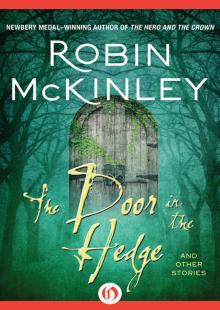 The Door in the Hedge
The Door in the Hedge